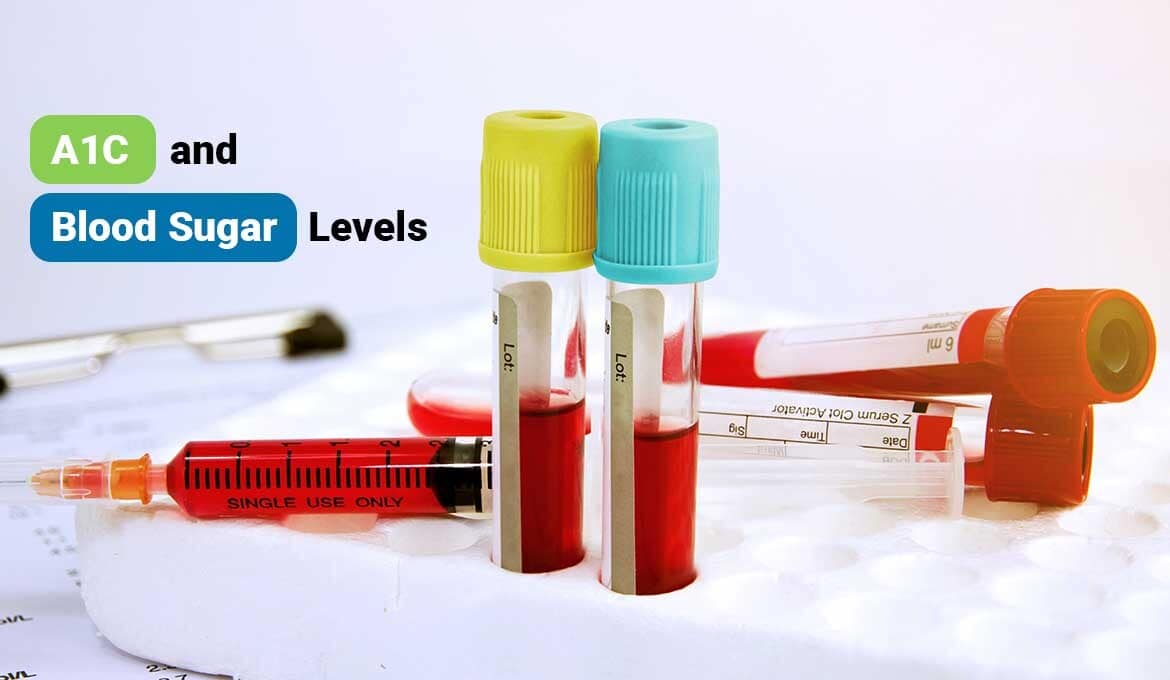
When glucose enters the bloodstream, it binds to hemoglobin (the red part of a blood cell that carries oxygen). Over time, the more glucose there is in the blood, the more hemoglobin gets glycated.
The A1C test measures the average amount of glucose that attaches to the hemoglobin over a few months. It's useful in diagnosing diabetes and prediabetes and helps people manage their diabetes.
Maintaining healthy blood sugar levels is the best way to lower your A1C. This will reduce your risk of complications from diabetes. It can also help you get the most out of your treatment, including medication and diet changes.
If your blood sugar levels are low, it will reflect in the A1C test results. Both tests are related as they show how well you are controlling your blood sugar level.
To learn more about the relationship between A1C and blood sugar levels, continue reading.
Blood Sugar Levels
Glucose comes from carbohydrates in the foods we eat. The body uses this glucose to provide energy to your cells, including the liver, muscle, and adipose tissue.
The pancreas secretes insulin, a hormone that helps the body use this sugar for energy and maintain normal blood glucose levels. Without insulin, high glucose levels can lead to diabetes.
A blood glucose test measures the level of sugar in your blood, which is a common way to screen for diabetes or other conditions. You can do it by using a glucometer. If your blood glucose level is more than 200 milligrams per decilitre, it means you have diabetes.
A1C Levels
A1C is a lab test that measures the percentage of hemoglobin in your blood that has been glycated or coated with glucose. It can help diagnose diabetes and prediabetes, as well as monitor long-term glycemic control.
This test shows the average of your blood sugar levels over the past 2 to 3 months. The lower your A1C, the better your diabetes control. The normal range of A1C is below 5.7%. If your A1C is between 5.7% and 6.4%, it means prediabetes. An A1C level of 6.5% or higher indicates diabetes.
Is There A Relationship Between A1C and Blood Sugar Levels?
Yes, there is a direct relationship between A1C and blood sugar levels. A1C is a test that shows your glycemic control (blood sugar control) over a period of 3 months. In fact, you can even convert A1C values into the same units as at-home glucose meters, which shows blood sugar level.
Glucose is a type of natural sugar in the body that helps the cells use energy. When the amount of sugar in the blood is too high, it can lead to diabetes.
Hemoglobin A1C is a percentage that tells you how much glucose has been in your blood over the past three months. A1C can be a good general indicator of how well you're managing your diabetes.
However, if you have diabetes, you need to regularly monitor your blood glucose level. A person with type 1 or type 2 diabetes should test their blood sugar at least twice a day to get an accurate picture of daily changes in blood glucose levels.
The Relationship between A1C and Blood Sugar Levels
When it comes to diabetes, one of the most important tests is your hemoglobin A1C (HbA1c). It's a way to monitor how well you're managing your disease over time.
Your HbA1c is a measure of the amount of glucose that's attached to the hemoglobin protein on your red blood cells over the past two to three months. The more glycated hemoglobin you have, the higher your HbA1c will be.
A1C testing is based on a process called glycation, which happens when sugar sticks to hemoglobin and can stay there for about 120 days. Over the course of these days, the number of glycated hemoglobin increases.
While the A1C test shows the level of glucose in the blood over a period of 2 to 3 months, a simple blood glucose test shows immediate results.
Your blood sugar levels fluctuate depending on the type of food you eat, the amount of exercise you indulge in, and the medications you are taking.
Because of this reason, doctors often rely on the A1C test as it shows your blood sugar levels over a period of a few months. This test is more reliable and shows a bigger picture. It shows how well your body is able to use insulin or whether a diabetes treatment plan is working.
A1C testing can help your healthcare provider diagnose diabetes and prediabetes and find out if you need to make changes to your treatment plan.
However, if you want to keep your A1C level low, you need to control your blood sugar. Your blood sugar level directly affects your A1C level.
What If A1C Is Normal, But Glucose Is Above Optimized?
HbA1c is a lab test that measures the percentage of hemoglobin in your blood that has been glycated or coated with glucose. This test helps to show your average blood glucose level over a period of 2 to 3 months. It gives a more accurate diagnosis of diabetes.
It is quite common to have a normal A1C level but a high blood glucose level. There are many things that can affect your immediate blood glucose level. For example, if you eat sugary food and test your blood sugar level immediately, it will be high.
But this doesn't mean you have diabetes. The diagnosis of diabetes depends on how well your body processes sugar over a period of time. You can also measure this with the help of the A1C test.
Because of this reason, healthcare professionals rely on the A1C test for a diabetes treatment plan. Here are the three things that can affect your blood sugar levels temporarily.
Conclusion
Your blood glucose level is affected by a lot of things, including diet, sleep, stress, exercise, and medicine. It's also influenced by the way your body handles glucose during a high or low. The goal is to keep both your blood glucose level and your hemoglobin A1C within a healthy range.
Hemoglobin A1C is a percentage of the glucose that attaches itself to hemoglobin in your blood. The hemoglobin has a lifespan of about three months, so the A1C test measures how much glucose is attached to the hemoglobin over the past 3 months. This test is also more reliable and gives your doctor a bigger picture of your glycemic control.
Read Also:





